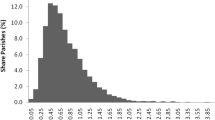Abstract
One issue in the debate on the welfare-state is whether state-care renders society more livable or not. The positive view is that people flourish in the welfare-state, the negative view is that people thrive better without. This article approaches the dispute empirically, by comparing livability of nations that differ in state-welfare-effort. The livability of nations is measured by the degree to which its citizens live long and happily. State-welfare-effect is measured by the scope of welfare-laws and the size of state-welfare-expenditures.
Data on average appreciation-of-life around 1980 are available for 28 nations; mostly rich ones. Appreciation-of-life appears somewhat greater in the nations that provide most state-welfare. However, that difference is entirely due to parallel differences in economic affluence. Data on change in life-satisfaction between 1950 and 1980 are available for only 10 nations, all rich ones. Life-satisfaction did not increase more in the nations where state-welfare expanded most.
Data on length-of-life in 1980 are available for 97 nations, of which 28 rich ones. Life-expectancy appears to be greater in the nations that provide most state-welfare, but again the difference disappears when income per head is controlled. Data on change in life-expectancy 1965–1985 are available for 35 nations. Gains in life-expectancy appear not greater in the nations were state-welfare expanded most.
It is concluded that state involvement in welfare provision does not create a more livable society. Apparently, non-state welfare works out equally well in present day conditions.
Similar content being viewed by others
References
Alber, J.: 1988, Is there a crisis of the welfare state? Cross-national evidence from Europe, North America, and Japan', European Sociological Review 4, pp. 181–183.
Borenstein, L.: 1993, Comparative GDP levels, Physical Indicators, phase III (United Nations: New York).
Chelf, C. P.: 1992, Controversial Issues in Social Welfare Policy; Government and the Pursuit of Happiness (Sage: London).
Douglas, J. D.: 1989, The Myth of the Welfare State (Transaction Publisher: New Brunswick).
Esping-Anderson, G.: 1990, The Three World of Welfare Capitalism (Polity Press: Cambridge).
Estes, R.: 1984, The Social Progress of Nations (Preager: New York).
George, V. and Wilding, P.: 1984, The Impact of Social Policy (Routledge: London).
Gordon, M. S.: 1988, Social Security Policies in Industrial Countries (Cambridge University Press: New York).
Hayek, F. A.: 1946, The Road to Serfdom (Routledge: London).
ILO: 1988, ‘The costs of social security: 12th international inquiry 1981–1983’, International Labour Organization: Geneva.
IMF: 1986, Manual on Government Finance Statistics (International Monetary Fund: Washington).
Mishra, R.: 1984, The Welfare State in Crisis (Harvester: Brighton).
Murray, G.: 1984, Loosing Ground: American Social Policy 1950–1980 (Basic Books: New York).
Naroll, R.: 1983, The Moral Order: An Introduction to the Human Situation (Sage: New York).
OECD: 1990, Social Expenditures 1960–1990 (Organization for Economic Development: Paris).
Ouweneel, P. and R. Veenhoven: 1990, ‘Differences in happiness across nations: Cultural bias or societal quality?’ in: N. Bleichrotdt and P. J. Drenth (eds.), Contemporary Issues in Cross-Cultural Psychology (Swets & Zeitlinger: Amsterdam), pp. 168–184.
Summers, R. and A. Heston: 1988, ‘A new set of international comparisons of real product and price level estimates for 130 countries, 1950–1985’, National Income and Wealth 34, pp. 1–25.
UNDP: 1990, World Development Report (Oxford University Press: London).
Veenhoven, R.: 1984, Conditions of Happiness (Kluwer Academic: Dordrecht).
Veenhoven, R.: 1986, ‘Cultural bias in rating of perceived life quality’, Social Indicator Research 19, pp. 329–334.
Veenhoven, R.: 1991, ‘Is happiness relative?’, Social Indicators Research 24, pp. 1–34.
Veenhoven, R.: 1993, ‘Happiness in nations: subjective appreciation of life in 56 nations 1946–1992’, RISBO, Erasmus University, Rotterdam (electronically published on ftp.eur.nlpub\database.happiness\nations).
Veenhoven, R.: 1994, ‘Is happiness a trait? Tests of the theory that a better society does not make people an happier’, Social Indicators Research 32, pp. 101–160.
Veenhoven, R.: 1995, ‘The cross-national pattern of happiness: Tests of predications implied in three theories of happines’, Social Indicators Research 34, pp. 33–68.
Veenhoven, R. and P. Ouweneel: ‘Equality in the welfare-state: dispersion in satisfaction-with-life and length-of-life in nations varying in state-welfare-effect’, (in preparation).
WHO: 1988, World Health Statistics Annual (World Health Organization: Geneva).
Zapf: 1994, Modernisierung, Wohlfahrtsentwicklung und Transformation: Soziologische Aufsätze 1987–1994 (Edition Sigma, Berlin).
Author information
Authors and Affiliations
Rights and permissions
About this article
Cite this article
Veenhoven, R., Ouweneel, P. Livability of the welfare-state. Soc Indic Res 36, 1–48 (1995). https://doi.org/10.1007/BF01079395
Accepted:
Issue Date:
DOI: https://doi.org/10.1007/BF01079395




